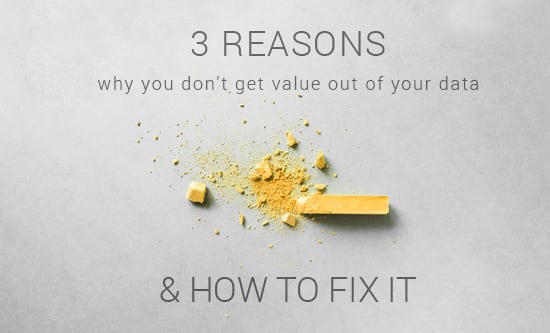It’s much easier to collect data than it is to create value from it. It’s not hard to get customers to sign up for a loyalty program or to get customers consent to use their data. So why is it so hard to create value from it? The truth is, because it’s unbelievably difficult to create value at scale. It’s easy to create a campaign that makes money but it’s hard to do that at scale. However, it’s scale you need to move the dial on your business. Scale means pouring over every piece of data.
Amazon reckons that around 30% of their sales are a result of their targeting decisoning and product recommendations. To achieve this Amazon invests billions in technology and specialist skills every year.
So here is my take on why most organisations have data, people and technology, but don’t get the 30% uplift in sales.
1. Core business
For most organisations, data science and customer engagement might be a focus but it’s never the business. Amazon is a data company that started selling books but could have been selling anything…and now it does. In most businesses that I see they talk about having a focus on putting the customer and data at the centre, but as soon as sales go soft….they start blasting everything to everyone. They invest in tools and people, but the people move on, the focus changes and they get new tools, new people and it all starts to look like groundhog day.
2. Innovation
Success requires a constant and relentless commitment to innovation. There are a lot of people who work in this space and who understand it, but there are very few innovators. On top of that, most innovators generally, don’t want to work for a single brand (unless you are Amazon) and if they do they won’t stay very long. Usually, innovators want to work in a startup or an environment where they get to work with multiple clients in multiple industries.
3. Sustainability
Under David Thodey, Telstra was relentlessly focused on the customer and invested heavily in analytics and customer marketing. When Thodey started, their share price was around $3.20, over 6 years the share price had risen to around $6.30 in 2015. After Thodey left, Telstra swang back to being product-centric again, most of the marketing folk under Thodey left too, and the 6 years of gains have been lost in 3. The share price is now back to where it was in 2009.
So how can organisations get value out of their data and drive significant sales, when it is not their core business and innovation and sustainability are constant challenges? One option is to have a partner who has this in their DNA. A partner who lives and breathes data, customer centricity and engagement, a partner who has it as their business to bring innovation to your company.
When we started talking to Rabbit Rewards in Thailand, it was a program with all the classic hallmarks of an in-house loyalty program. Large customer base, mostly inactive and unresponsive.
Today acquisition is up 400% and redemptions, our key measure of success, have doubled. More importantly, 36% of redemptions are driven directly from highly targeted personalised offers. Rabbit Rewards is now a joint venture between Digital Alchemy and the BTS group, the operator of the Bangkok metro system. It’s not a contractual arrangement, it’s a permanent partnership based on strict KPI’s and shared objectives.
See how we’ve helped Rabbit Rewards turn things around. Download our case study
 by Regan Yan, the CEO of Digital Alchemy.
by Regan Yan, the CEO of Digital Alchemy.
Regan is a subject-matter expert in analytical database marketing and customer relationship marketing, as well as an in-demand presenter and keynote speaker at national and international events. He also authors thought leadership pieces on data-driven marketing that can be found on the DA Blog.
[pardot-form id=”46577″ title=”Blog Sign up test1″]



